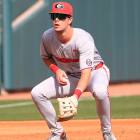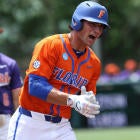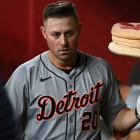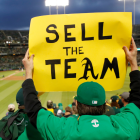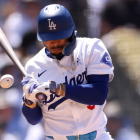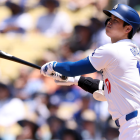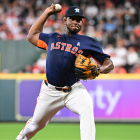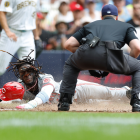The Seattle Mariners have spent the last few seasons in a place no team wants to be: the middle. They haven't been good enough to qualify for the postseason nor bad enough to justify a complete tear-down and rebuild. The Mariners went 86-76 and fell three games short of a wild-card spot in 2016. Three years ago they were one game short of a postseason berth.
Seattle's roster says they should go for it, and GM Jerry Dipoto has acted accordingly this offseason. The Mariners have key players like Felix Hernandez, Robinson Cano, Kyle Seager, and Nelson Cruz locked up for big money -- all but Cruz are signed through 2019 -- so Dipoto has focused on improving the supporting cast this winter. He's made three trades to add proven big league veterans:
- Nov. 7: Traded lefty Vidal Nuno to the Dodgers for catcher Carlos Ruiz.
- Nov. 12: Traded minor-leaguer Paul Blackburn to the Athletics for platoon bat Danny Valencia.
- Nov. 23: Traded righty Taijuan Walker and shortstop Ketel Marte to the Diamondbacks for infielder Jean Segura and minor-leaguers Zac Curtis and Mitch Haniger.
All three trades addressed pressing needs. Ruiz gives the Mariners a veteran backup catcher behind Mike Zunino who could step in and start, if needed. Valencia adds lineup balance as a big righty bat, and Segura will take over as the starting shortstop, a position that has given Seattle some headaches over the years -- basically since Alex Rodriguez left.
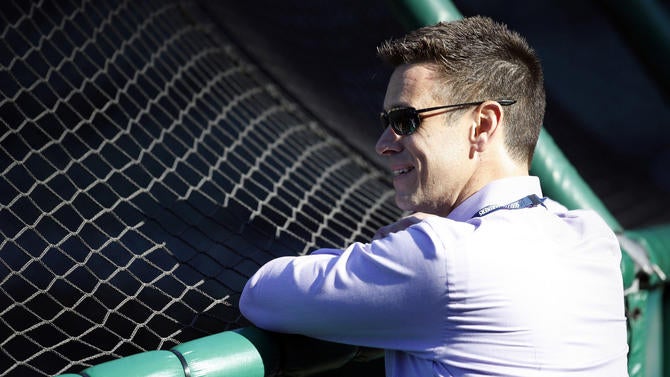
In each of those three trades, Dipoto traded an arm for a bat. Nuno had a solid season out of the bullpen in 2016 and Walker has been The Next Big Thing for about four years now. Blackburn is not a top prospect, though he threw 143 quality innings in Double-A this past season, meaning he was likely to start 2017 in Triple-A and be a call-up option at some point during the summer.
This is the Mariners' current rotation depth chart -- Nuno was a reliever in 2016, but he has started in the past and has a starter's repertoire, meaning he would have been an emergency rotation option -- following those three trades:
- Felix Hernandez: Still the King, but Felix has started to show very real signs of decline in his strikeout and walk rates, among other things.
- Hisashi Iwakuma: Veteran workhorse made 33 starts in 2016. It was the worst season of his MLB career by almost any measure, however.
- James Paxton: Talented lefty with suddenly big velocity and also a very ugly injury history. His 121 innings in 2016 were his most since throwing 169 2/3 in 2013.
- Ariel Miranda: Promising southpaw with 10 big-league starts under his belt.
- Nathan Karns: Pitched so poorly as a starter this past season he had to be demoted to the bullpen. Karns finished 2016 with a 5.15 ERA in 94 1/3 total innings.
- Cody Martin: Waiver pickup with a 6.07 ERA in 56 1/3 career MLB innings.
- Zach Lee: Former first-round pick had a 6.14 ERA in 148 Triple-A innings in 2016.
Even giving Felix and Iwakuma the benefit of the doubt given their track records, there is still an awful lot uncertainty on the depth chart. Paxton has a ton of ability but just hasn't been able to stay healthy. Miranda is close to an unknown. Karns, Martin, and Lee? You'd rather they be Nos. 7-9 on your rotation depth chart, not Nos. 5-7.
Fortunately for Dipoto, there is still plenty of offseason remaining, so he has time to reinforce his rotation. Adding at least one starter feels like a must. There are two potential obstacles in his way.
1. How much can they spend?
This free agent pitching class is very thin, though if you need a No. 4 or 5 starter, you should be able to find one. You just might have to pay No. 2 or 3 starter money to get a guy like, say, Ivan Nova or Jason Hammel. It's either that, or roll the dice with a reclamation project like Brett Anderson or Doug Fister.
Based on Cot's Baseball Contracts and MLB Trade Rumors' arbitration projections, the Mariners currently have approximately $127 million tied up in 14 players. (They took on about $13 million in the Ruiz, Valencia, and Segura trades.) The team opened 2016 with a $143 million payroll, a franchise record, so while they still have some wiggle room under that number, it's not a ton.
For what it's worth, both Dipoto and Mariners CEO John Stanton told Ryan Divish of the Seattle Times the team's payroll would increase in 2017. Neither would say exactly how much it will increase, though Stanton seemed to indicate ownership will consider upping payroll on a case-by-case basis.
"If Jerry came to us and said there was the one piece that I think we needed to be successful, I think we'd go out and get it," Stanton said.
Money may or may not be an issue for the Mariners in their search for pitching. If it isn't, then Dipoto will have to navigate the free agent minefield to find a reliable starter. It money is an issue, then he'll either have to take a low-cost flier (Fister, Anderson, etc.) or get creative somehow.
2. Is their farm system good enough to make an impact trade?
The Mariners traded pieces off their major-league roster to get Ruiz and Segura. They did dip into their farm system to land Valencia, though that was a relatively minor trade. Seattle's farm system is improved but it remains in the bottom half of the league overall. MLB.com currently lists two Mariners farmhands among the top 100 prospects in baseball:
- OF Kyle Lewis (No. 28 on top 100): The 11th overall pick in the 2016 draft. He tore his ACL and other knee ligaments in a home plate collision in July and needed season-ending surgery.
- OF Tyler O'Neill (No. 59): Hit a healthy .293/.374/.508 with 24 home runs in 130 Double-A games in 2016. He also struck out in 26 percent of his plate appearances.
The Mariners are not the Yankees, Red Sox, Cubs, or Dodgers. Those teams have deep farm systems with multiple high-end prospects. They have the ability to go out and get an impact pitcher like, say, Chris Sale or Chris Archer. The question for them is how much they're willing to surrender. With the Mariners, the question is whether they have the pieces to get it done.

Dipoto has the option of trading more pieces off his major-league roster to get a starter, though teams trying to contend usually don't like to do that. They like to keep their big-leaguers and add to them. Not subtract players to add other players. The thin free-agent class means the starting pitcher trade market will be fiercely competitive, and given their less-than-stellar farm system, the Mariners will be at a disadvantage.
The Mariners have to compete with the Rangers and Astros in the AL West, not to mention all the other wild-card contenders in the AL. Their rotation as it stands might be good enough to sneak into the postseason. Felix and Iwakuma could rebound, Paxton could stay healthy, Miranda could surprise ... it could happen. Dipoto has to prepare for the worst though.
At the moment, Seattle's best path to improving the rotation is free agency, which will almost certainly require an increase in payroll. It doesn't sound like that will be a big deal -- I can't imagine Dipoto would have taken on $13 million in his three notable trades if he were that concerned about the budget -- though until it happens, you never really know. Even then, there's still the matter of the weak free agent class.
Dipoto has done well to improve his club's offense. Segura and Valencia figure to be significant upgrades over the guys they're replacing (Marte and Adam Lind). Ruiz should help more than this season's revolving door of backup catchers (Chris Iannetta, Steve Clevenger, Jesus Sucre). To make those upgrades, Dipoto had to rob Peter to pay Paul. He traded away quite a bit of pitching depth, and now he has to replenish it.














